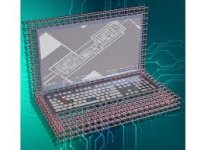Computers have evolved rapidly over the past few decades — from bulky desktops to ultra-slim laptops, and now to powerful smartphones and wearables. But what lies ahead? As we stand on the brink of another technological revolution, it's clear that the future of computers won't just be about better processors or slimmer designs — it’s about a fundamental shift in how we interact with and think about computing itself.
For over 50 years, Moore’s Law predicted that the number of transistors on a chip would double every two years, making computers faster and more powerful. But now, we’re reaching the physical limits of silicon.
Enter quantum computing — a technology that uses the principles of quantum mechanics to process information in a completely different way. Instead of bits (0s and 1s), quantum computers use qubits that can be both 0 and 1 simultaneously. Companies like Google, IBM, and Intel are racing to make quantum computing commercially viable.
While mainstream usage is still years away, quantum computers promise to revolutionize fields like:
Modern computers are no longer passive tools — they’re learning and adapting through artificial intelligence. From your smartphone suggesting replies to emails, to AI-powered personal assistants, computing is becoming more intelligent and personalized.
In the future, we’ll likely see:
The combination of AI with computing power will change not just how we use computers, but how they think for us.
Imagine typing an email with your thoughts or controlling your computer with just your brain. Companies like Neuralink and Meta are working on brain-computer interfaces (BCIs) to make this a reality.
BCIs could potentially:
While still experimental, this tech could redefine what a "computer" even means.
In the future, computers may not look like computers at all. With the rise of edge computing, data processing will happen close to the source — whether that’s your smart fridge or autonomous vehicle.
Coupled with cloud computing, we’ll be surrounded by invisible computers that are embedded in everything:
Computers will become ubiquitous, always on, always connected, and deeply integrated into our daily lives.
As computers grow more powerful and embedded into our lives, concerns naturally arise:
 From Silicon to Quantum: A New Era of Processing Power
From Silicon to Quantum: A New Era of Processing Power
For over 50 years, Moore’s Law predicted that the number of transistors on a chip would double every two years, making computers faster and more powerful. But now, we’re reaching the physical limits of silicon.
Enter quantum computing — a technology that uses the principles of quantum mechanics to process information in a completely different way. Instead of bits (0s and 1s), quantum computers use qubits that can be both 0 and 1 simultaneously. Companies like Google, IBM, and Intel are racing to make quantum computing commercially viable.
While mainstream usage is still years away, quantum computers promise to revolutionize fields like:
- Drug discovery
- Weather forecasting
- Cryptography
- Financial modeling
 AI-Integrated Computers: Smarter Than Ever
AI-Integrated Computers: Smarter Than Ever
Modern computers are no longer passive tools — they’re learning and adapting through artificial intelligence. From your smartphone suggesting replies to emails, to AI-powered personal assistants, computing is becoming more intelligent and personalized.
In the future, we’ll likely see:
- Emotionally aware systems that respond based on your mood.
- Self-healing software that detects and fixes bugs automatically.
- AI co-pilots for coding, writing, and design.
The combination of AI with computing power will change not just how we use computers, but how they think for us.
 Brain-Computer Interfaces: Science Fiction or Reality?
Brain-Computer Interfaces: Science Fiction or Reality?
Imagine typing an email with your thoughts or controlling your computer with just your brain. Companies like Neuralink and Meta are working on brain-computer interfaces (BCIs) to make this a reality.
BCIs could potentially:
- Help paralyzed individuals regain communication
- Enhance gaming and VR experiences
- Replace traditional input devices like keyboards and touchscreens
While still experimental, this tech could redefine what a "computer" even means.
 Computing Anywhere: Edge, Cloud, and Ubiquity
Computing Anywhere: Edge, Cloud, and Ubiquity
In the future, computers may not look like computers at all. With the rise of edge computing, data processing will happen close to the source — whether that’s your smart fridge or autonomous vehicle.
Coupled with cloud computing, we’ll be surrounded by invisible computers that are embedded in everything:
- Smart homes
- Connected healthcare devices
- Augmented reality glasses
Computers will become ubiquitous, always on, always connected, and deeply integrated into our daily lives.
 Let’s Discuss: Is the Future Exciting or Alarming?
Let’s Discuss: Is the Future Exciting or Alarming?
As computers grow more powerful and embedded into our lives, concerns naturally arise:
- Will jobs be lost to automation?
- What about privacy in a hyper-connected world?
- Can we trust AI to make important decisions?

